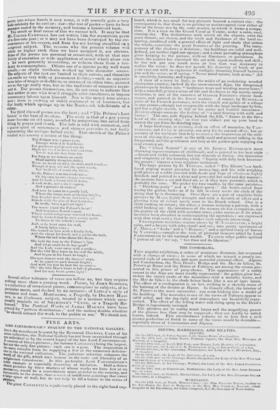THE PALMER'S LAST ',Esselte. Some seven years have elapsed since
we welcomed Mr. CALDER CAMPBELL'S Lays of the East, as "really a volume of poetry." In the time which has passed, he has improved, but ret advanced; at all events be has not taken a stride. His versifica- tion is neater and better-tuned than of yore ; his sentiments are. often more manly, or rather more matured ; and he retains be tenderness of feeling, his yearnings after home and home's affec- tious. But though this volume will please all true lovers of rosin. into whose its it may come, it will scarcely gaina very
eCelebrity for Its nuthor ; nor—the test of poetry—have its best pages rooted in the memory. and become a household book.
The occult or final cause of this we cannot tell. It may be that gr. CALDER CAMPBELL has not within lam the mysterious germ of first-rate poet ; or it may not have been developed by the cir- cumstances of his career, and from his not having stumbled en a congenial subject. The reasons why the present volume will attain no higher rank than we have assigned it, are obvious. Some of the poems are personal or occasional, witht,ut that rare fplirity of execution or wide application of moral which alone can r ler such generally interesting, or redeem them from a ten- docy to commonplace. Others are of a species pretty well worn fiready,— slight incidents worked up into dramatic scenes. 85 The subjects of the rest are limited in their nature, and therefore can excite too very wide or permanent feelin7,—such as supersti- tious tales of magic or diablerie, or stories of an olden time, painted not as the age really was, but as the traditions of romances repre- sent it. The poems themselves, too, do not seem to indicate that their author is one who would struggle alter excellence, or impose unnecessary labour upon himself. Nor is the moral tone always
pure: there is nothing of sickly sentiment or looseness, but that laxity which springs up in the Noah's ark inhabitants of a colony. lie third class of poems are the best ; and "The Palmer's Last
Lesson" is the best of its class. The story is that of a gay young sinner become an old saint, assailed by temptation, but saved from falling by prayer and death. The tale is told with animation, and a quaint spirit of seriousness and slyness uervades it, not badly representing the antique ballad style. This sketch of the Palmer
asmiled will convey a notion of the thing.
The Palmer was a pions man,
Though wieked he had been ; For penitence and prmer can 110
Much toe the thritotOi hold aud true,
Yet be was not free it sin. For long as we remain on earth Shall earthly thoughts defile;
Willie we tread on dtot, its stain must touch-
'lhiiiigli it may not soil the spirit much,
Yet 'twill tell of earth the while. So the Pahtur was too conin'ent-
Of his own heart's t liangc too sure;
And he bath a let,son to learn,
A task to du, mid a Sin t,I
And a penance to endut e.
And now he came to a goodly hall, Where the lamps were glitteling brisiht ; Gay knights were there, and air Drunk with the glee of that festival— In south, 'twas a gallant sight ! The music joyed the Palater's heart !
Arid fiagrance floated round,
W Ionic Scents ttttt E touched his bruin; And he wislud that he were young again.
To dance to the reheck's sound; And, as he leant upon his staff, A lovely ladye She looked on him with a kindly look,
And she elaspt his hand, and a goblet she took, Where the red wine shone like. flame.
She held the vase to the Pahner's lips,
And what could he do but quaff?
And the Lade went away with a smile— But the Old -Man leant on his staff the while,
And began in his heart to laugh ; Ilia eyes danced with the dancers' steps,
As he gazed on each damsel bright; And with his foot he beat the measure— Oh ! the Clbl Man's heart is full of pleasure,
Arid his very hi out grows light !



























 Previous page
Previous page